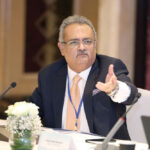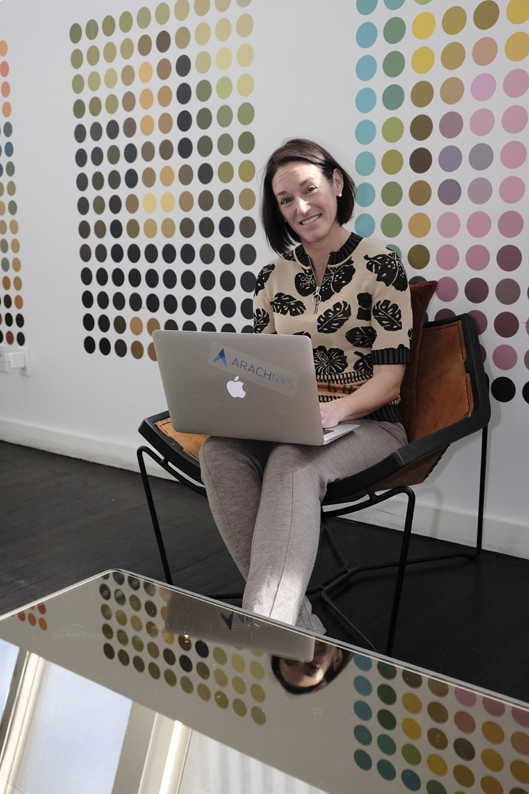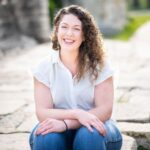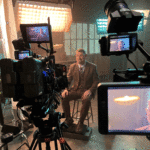
Rachel Stephenson ’96 relies on “liberal arts mindset” to guide her decisions

For Rachel Stephenson ’96, there have been multiple times in her life where she’s realized she needed to look at the whole picture, to ask questions, and think about the skills she has and how to deploy them—an approach she says she developed at Wooster that continues to guide the work she does today. Stephenson works with top tier financial institutions as a sales director for Arachnys, a technology platform powered by artificial intelligence that looks for patterns and relationships to feed information back to these institutions to enhance their anti-money laundering practice. She knows she plays only a small part in combatting human trafficking, drug dealing, and the resulting money laundering in the financial industry, but “knowing who you’re doing business with, who they’re doing business with, and how to keep the bad actors out of your bank” is an important part of fighting these issues. “Human trafficking is a rising problem in the Raleigh-Durham area,” she explained, “and this is a marginal way for me to give back to my community. Traffickers of all varieties look for ways to get their money back into the banking system so they can use it.”
After 19 years in the banking industry as a financial advisor, branch manager, and in a variety of roles in marketing and operations, Stephenson’s experience guides her as she works with financial investigators and compliance departments at financial institutions to understand their risks, why they may have been flagged and the regulations relevant to their region and jurisdiction. She also works with regulatory agencies including the Office of Currency and Comptroller (OCC) and Federal Deposit Insurance Corporation (FDIC), and exchanges information with law enforcement agencies about what information is needed to prosecute money launderers and the criminal penalties involved. “It’s as simple and complicated as knowing who you’re doing business with and knowing where the money is coming from,” said Stephenson, “watching for suspicious behavior like spending or consulting outside the scope of the business and asking questions about what you’re not seeing.”
Developing the tools to make informed financial decisions comes naturally to Stephenson whose mother, a school teacher, and father, a controller, gave her a “checkbook” at age 12. “I remember being upset about not having enough money to buy a dress for the spring formal dance after spending it all in the fall and learning to budget. Financial literacy was part of a regular conversation at home.” When it came to choosing the right school, it was the idea of a long-term research project that drew Stephenson to Wooster. Having studied as a history major, she appreciates that “History is written by the winners. Having a healthy skepticism and curiosity helps direct a whole picture of understanding.” Completing her Independent Study on German Nationalism through the eyes of a collection of films produced after World War II, she remembers a question that one of her advisors, history professor Peter Pozefsky, stumped her with during her orals, “He asked what they didn’t show in the films, and I didn’t know. It was a great question. It stuck with me, the idea of asking ‘What are you not seeing? Have you been skeptical enough, curious enough to really get to the root and understand what the person across from you is trying to say?’” Having to defend her research and think on her feet taught Stephenson about how to prepare for similar situations in her career. “It taught me what I need to do to be successful,” she said. “I’m writing a totally different presentation today, but going through I.S. taught me where I’m weak and where I’m strong, what I can do on the fly and what I can’t. To carry that into the workforce is invaluable.”
Though history and finance might not be a natural combination, understanding her skills and experiences through her “liberal arts mindset” allowed Stephenson to apply them in her work and in the world around her in a way that is important to her. “Financial literacy is exceptionally empowering. Once you give that to somebody, nobody can take it away. I’ve always loved science and technology, so I looked at what skills I have and thought about how that translates outside of banking,” she said of the decision that led her to her current position. “I can still interface with financial institutions because of the knowledge base and experience that I have. It’s about where I’m able to have the largest impact. Is it helping forthright, right out in front, clearing out hurdles behind the scenes, or is it a combination of those things?”
Posted in Alumni on June 17, 2019.
Related Posts
Related Areas of Study
History
Critically examine events and societies of the past and learn to tell the stories future generations need to know
Major Minor

